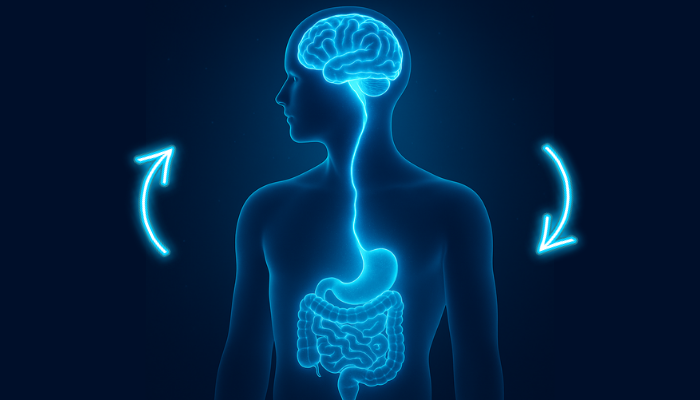Ever feel like your belly goes from flat to full in a matter of minutes? That sudden, swollen, sometimes painful pressure is bloating—and it’s more than just a nuisance. For many, it’s a daily discomfort. For others, it’s an occasional mystery. Either way, bloating is your body’s way of telling you something’s off.
Instead of masking the symptoms, this article helps you get to the root. Because once you understand what’s behind the bloat, relief becomes possible—and lasting.
In this article
What Is Bloating?
Bloating is typically caused by excess gas or air trapped in your gastrointestinal (GI) tract. As your digestive system breaks down food, it naturally produces gas. Usually, this gas moves through the intestines without issue.
But when it builds up or gets stuck, it creates that familiar feeling of tightness, pressure, or fullness. It’s different from water retention (which involves excess fluids in your tissues), but both can feel similar—and uncomfortable.
Common Causes of Bloating
While everyone’s triggers are unique, most causes of bloating fall into a few key categories:
The Usual Suspects on Your Plate
Cruciferous vegetables
Broccoli, cauliflower, Brussels sprouts, and cabbage contain raffinose—a carbohydrate that’s tough to digest. While they’re nutrient-rich, they can cause temporary bloating, especially when raw.
Beans and lentils
Packed with fibre and protein, legumes are great for your gut but are also known for producing gas during digestion.
Carbonated drinks and swallowed air
Chewing gum, drinking through a straw, or eating too quickly introduces extra air into your digestive system. Fizzy drinks add even more gas directly.
Sugar alcohols and artificial sweeteners
Sorbitol, xylitol, and erythritol (often found in “sugar-free” products) aren’t fully absorbed in the small intestine and are fermented by gut bacteria—leading to gas and bloating.
Dairy and gluten
Lactose intolerance is common, especially in adulthood. Similarly, non-celiac gluten sensitivity can trigger bloating in some people.
Too much fibre, too fast
Fibre is essential for digestive health, but a sudden increase can overwhelm your gut, causing your microbes to produce more gas as they adapt.
Lifestyle Habits That Contribute
- Stress
Chronic stress slows digestion and alters your gut microbiome, increasing the chance of bloating and discomfort. It can also cause the abdominal muscles to tense, making symptoms worse. - Lack of movement
Sedentary behaviour slows gut motility, making it harder for gas to move through your system. - Hormonal shifts
Many women experience bloating before and during menstruation, thanks to changing levels of estrogen and progesterone, which influence water retention and gut motility. - Dehydration
Without enough water, your body holds on to fluids—and digestion slows. This can cause bloating, constipation, and a feeling of heaviness.
How to Reduce Bloating: Simple Fixes That Actually Work
The good news? Most bloating is manageable—and reversible. Here’s how to take back control:
- Eat Mindfully
Slow down. Chew thoroughly. Avoid talking while eating or multitasking during meals. Eating too quickly increases swallowed air and makes digestion harder. - Sip Smarter
Hydrate well, but skip the bubbles. Replace carbonated drinks with still water or soothing herbal teas like peppermint, ginger, or chamomile—all of which support digestion.
To optimise digestive function, try to drink most of your fluids between meals rather than during them. Large amounts of liquid at mealtime may dilute stomach acid and enzymes, which can impair digestion and contribute to bloating—especially in sensitive individuals. - Support Your Microbiome
A healthy gut is key to reducing bloating. Feed your microbiome with prebiotic foods (like garlic, onions, bananas), and consider a probiotic supplement to restore balance—especially after antibiotics, stress, or travel.
For targeted support, try AVEA Biomind, a next-generation probiotic designed to improve gut comfort, reduce bloating, and support the gut-brain axis. It contains 10 carefully selected strains (30 billion CFUs), Duocap® technology for optimal delivery, plus Panax Ginseng and B vitamins for mental clarity and digestive resilience.

- Get Moving
A light walk after meals can significantly aid digestion and help gas move through your system. Gentle yoga twists or stretching also supports gut motility and reduces bloating. - Cook Gas-Producing Veggies
Lightly steaming or sautéing cruciferous vegetables and legumes can make them easier to digest. This reduces the load on your gut and the amount of gas produced. - Track Your Triggers
Keeping a simple food and symptom journal can help you connect the dots. Patterns often reveal hidden intolerances or stress-related flares that you can address directly.
Reframe the Conversation: Bloating as Feedback
Bloating isn’t your body “malfunctioning.” It’s a form of feedback—a signal from your digestive system that something needs adjusting.
Instead of seeing bloating as a random annoyance, try seeing it as data. It can guide you toward better food choices, healthier habits, and a more balanced gut.
With just a few consistent shifts—more movement, better hydration, mindful eating, and microbiome support—you can feel lighter, clearer, and more at ease in your body.












